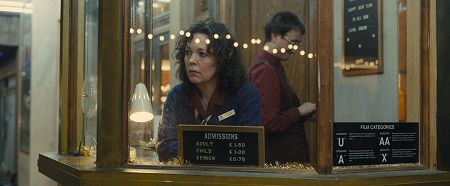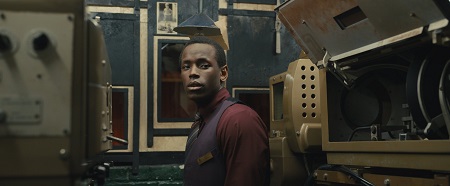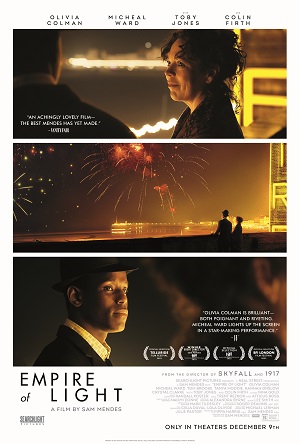
Oppressively Melodramatic Empire of Light Still Casts a Magically Cinematic Spell
There is nothing subtle about writer-director Sam Mendes’s Empire of Light. The film’s observations about gender, mental illness, and race are bluntly obvious. Its layers of treacly melodrama can feel oppressive, and there are moments so inauthentically bludgeoning they border on being laughable.
But this whimsical period piece is also magnificently shot by Roger Deakins (Fargo, 1917), features a hauntingly gorgeous score by Trent Reznor and Atticus Ross (The Social Network), and centers on a pair of multilayered, deftly heartfelt performances from stars Olivia Colman and Micheal Ward. Mendes also stages an elegantly ethereal climax, the film’s final moments an irresistibly loving celebration of friendship, art, and cinema that moved me to tears.
Suffice it to say, Empire of Light is undeniably messy. Its highs are stratospheric; its lows, borderline unforgivable. But as a purely audio-visual exercise, Mendes’s latest can be captivating. Even though the schmaltzy didacticism caused my eyes to roll back in my head, and even though I have more misgivings about the final product than I have fingers and toes, a part of me is still compelled to urge moviegoers to give the film a look.
Set in the early 1980s in a small English coastal town, the story takes place almost entirely at the Empire Theatre, a venue proudly owned and operated by Donald Ellis (Colin Firth). The quiet Hilary (Colman) is his dedicated manager and sometimes secretary, while the gruffly taciturn Norman (Toby Jones) is the venue’s exacting projectionist. The rest of the staff is made up of a cadre of locals young and old, with newcomer Stephen (Ward) the latest member of the crew.
Things get interesting when Hilary and Stephen succumb to their mutual attraction and begin a semi-secret relationship. They travel to the beach, spend their lunches together, and even nurse a pigeon with a broken wing back to health. But Hilary has a past that the staff of the Empire does not talk about, and many of her fellow employees — most notably Norman and the empathetic Neil (Tom Brooke) — are worried she’ll succumb to old habits, especially now that it appears she’s stopped taking her medications.
Mendes’s overstuffed screenplay doesn’t stop there. Ellis is a sexual predator who takes advantage of Hilary’s condition. She is battling mental illness, and her blossoming relationship with Stephen leads to unexpected emotional outbursts and semipsychotic delusions. He happens to be a Black man, the son of an immigrant, living in a majority white town whose most abhorrent citizens feel newly empowered in Margaret Thatcher’s England to openly display their violent racism.
Got all that? Mendes also throws in the British premiere of Chariots of Fire at the Empire, which culminates in a cringy face-off between Hilary and Ellis that would be unforgivably disgusting if not for Colman and Firth’s determined commitment to make the scene work. That they rise above the material during this moment shouldn’t come as a surprise (they each have Academy Awards sitting on their mantles at home, and for good reason), but this does not make the scene any less egregious.
Coincidence piles upon coincidence. Hackneyed storytelling contrivances assault the viewer with punishing ferocity. Some of the dialogue is so thunderously pummeling it can feel like Mendes is hammering it home with a jackhammer. A riot sequence right at the start of the third act is staged with all the finesse of a swift kick to the groin followed by a hard slap to the face. It’s so ill-conceived one begins to wonder if this is the same Mendes who created such magical poetry with nothing more than a floating plastic bag in American Beauty or generated such a consistent state of gut-wrenching intensity with the faux single-shot WWI thriller 1917.
But it all looks stunning, courtesy of Deakins. With a notable assist from production designer Mark Tildesley (No Time to Die), the Oscar-winning cinematographer does a stupendous job of making the Empire a living, breathing character standing tall inside this soap opera. The visuals have an immersive dexterity that’s intoxicating, and when those are coupled with the incredible sound design and augmented by Reznor and Ross’ fabulous score, the film becomes a seductively eerie spellbinder in which the plot no longer even matters.
Then there is the ending. Where Mendes leaves things is hardly special, and key elements are reminiscent of Giuseppe Tornatore’s classic Cinema Paradiso. But Colman and Jones underplay these last moments with an intimate simplicity that’s masterful, and the director stages his climax with a grace strangely absent from the rest of this undeniably personal drama. These scenes sing with a sparkling majesty, the power of the cinematic image rendered with mesmeric, breathtaking beauty.
Is this ending enough to save Empire of Light and make watching it worthwhile? For me it was, but I also didn’t have to pay for a ticket to get into the theater. Mendes has made far better films, and I am certain he will do so again. But if the viewer is in the right frame of mind and is willing to overlook several noticeable missteps, there is something magical to be found here. As to whether that magic has any staying power, only the passage of time will answer that question, even if my gut tells me it’s sadly unlikely.
Film Rating: 2½ (out of 4)








